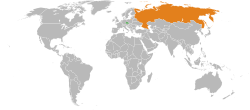- Czech Republic–Russia relations
-
Czech Republic-Russia relations 

Czech Republic
RussiaCzech Republic–Russia relations refers to bilateral foreign relations between the two countries, Czech Republic and Russia. Relations fluctuate from a feeling of brotherhood due to shared Slavic identity, to hatred and distrust, either for religious or government-related reasons. Relations are best described as bipolar.
Both countries have a common Slavic heritage, though Russia is an East Slavic country while Czechia is a West Slavic country. When relations between the competing Eastern Orthodox and Roman Catholic churches worsened, so did relations between the two, as the Czechs were mainly Catholic, and the Russians Eastern Orthodox; each tended to stand with their coreligionists. Although the Protestant Reformation occurred and had much influence in Czechia, removing the source of distrust, the two did not grow close until the 19th century.
Contents
History
During the 19th century, Russian foreign policy occasionally took a stance of supporting fellow-Slavic countries. The Czechs often resented the Habsburg rule, and the many Czechs that took part in its administration were not viewed as proof of its ethnic plurality by some, but rather simply as traitors. Following the reawakening of national consciousness among Czechs, Russia, an enemy of Austro-Hungary, was increasingly viewed as a possible savior. At the same time, there was distrust of Russia due to its Orthodox religion, and Russians also often viewed non-Orthodox Slavs as traitors, though it is to be noted that official policy only listed the Poles as traitors against Slavic values (mainly because in addition to being Catholic, Poland has a long history of fighting with Russia), and stated that the non-Polish Catholics were salvageable. This patronizing attitude however, may have disgusted many Czechs, but Russia was still viewed by many to be better than Austria (although there were also many pro-Habsburg Czechs).
The Czech Republic was formed with Slovakia as Czechoslovakia, while Russia as formed with other countries was the Soviet Union. Both countries were part of the Warsaw Pact to fight alliance against the NATO. Until August 21, 1968, this was when happened the Warsaw Pact invasion of Czechoslovakia. 108 Czechoslovaks died and approximately 500 were wounded as a direct result of the invasion. This invasion has stopped the Communist Party of Czechoslovakia. This has damaged the relations between the two countries. The Czech Republic later decided to join the NATO.
The present day relations between the two countries are at their best, and many agreements have been signed. Russia also has further reduced its oil deliveries to the Czech Republic. The Czech Republic has an embassy in Moscow, and two consulates general (in Saint Petersburg and Yekaterinburg). The Russian Federation has an embassy in Prague, and two consulate generals in (Brno and Karlovy Vary).
Both countries are full members of the Council of Europe and the Organization for Security and Co-operation in Europe.
Russian Federation relations
In its 2007 report the Czech counter-intelligence warned that espionage activity in the Czech Republic has currently reached an extremely high level and intensity. Russian secret services have worked to influence public opinion in various fields. They have also sought sensitive information on the Czech economy and contacts with politicians and state officials.[1]
References
External links
- Embassy of the Czech Republic in Moscow
- Consulate-General of the Czech Republic in Saint Petersburg[dead link]
- Embassy of the Russian Federation in Prague
 Foreign relations of Russia
Foreign relations of RussiaAfrica Algeria • Angola • Benin • Botswana • Burkina Faso • Burundi • Cameroon • Cape Verde • Central African Republic • Chad • Comoros • Congo, Democratic Republic of the • Congo, Republic of the • Côte d'Ivoire • Djibouti • Egypt • Equatorial Guinea • Eritrea • Ethiopia • Gabon • Gambia • Ghana • Guinea • Guinea-Bissau • Kenya • Lesotho • Liberia • Libya • Madagascar • Malawi • Mali • Mauritania • Mauritius • Morocco • Mozambique • Namibia • Niger • Nigeria • Rwanda • São Tomé and Príncipe • Senegal • Seychelles • Sierra Leone • Somalia • South Africa • South Sudan • Sudan • Swaziland • Tanzania • Togo • Tunisia • Uganda • Zambia • Zimbabwe
Asia Abkhazia • Afghanistan • Armenia • Azerbaijan • Bahrain • Bangladesh • Bhutan • Brunei • Burma • Cambodia • China, People's Republic of • China, Republic of • East Timor • Georgia • India • Indonesia • Iran • Iraq • Israel • Japan • Jordan • Kazakhstan • Korea, North • Korea, South • Kuwait • Kyrgyzstan • Laos • Lebanon • Malaysia • Maldives • Mongolia • Nepal • Oman • Pakistan • Palestine • Philippines • Qatar • Saudi Arabia • Singapore • South Ossetia • Sri Lanka • Syria • Tajikistan • Thailand • Turkey • Turkmenistan • United Arab Emirates • Uzbekistan • Vietnam • YemenEurope Albania • Andorra • Austria • Belarus • Belgium • Bosnia and Herzegovina • Bulgaria • Croatia • Cyprus • Czech Republic • Denmark • Estonia • Finland • France • Germany • Greece • Hungary • Iceland • Ireland • Italy • Latvia • Lithuania • Luxembourg • Macedonia • Malta • Moldova • Monaco • Montenegro • Netherlands • Norway • Poland • Portugal • Romania • San Marino • Serbia • Slovakia • Slovenia • Spain • Sweden • Switzerland • Turkey • Ukraine • United Kingdom • Vatican CityNorth America Antigua and Barbuda • Bahamas • Barbados • Belize • Canada • Costa Rica • Cuba • Dominica • Dominican Republic • El Salvador • Grenada • Guatemala • Haiti • Honduras • Jamaica • Mexico • Nicaragua • Panama • Saint Kitts and Nevis • Saint Lucia • Saint Vincent and the Grenadines • Trinidad and Tobago • United StatesOceania South America Multilateral Diplomacy Foreign relations of the Czech Republic Americas Argentina · Canada · Colombia · United States
Africa & Asia Europe Missions Categories:
Wikimedia Foundation. 2010.
